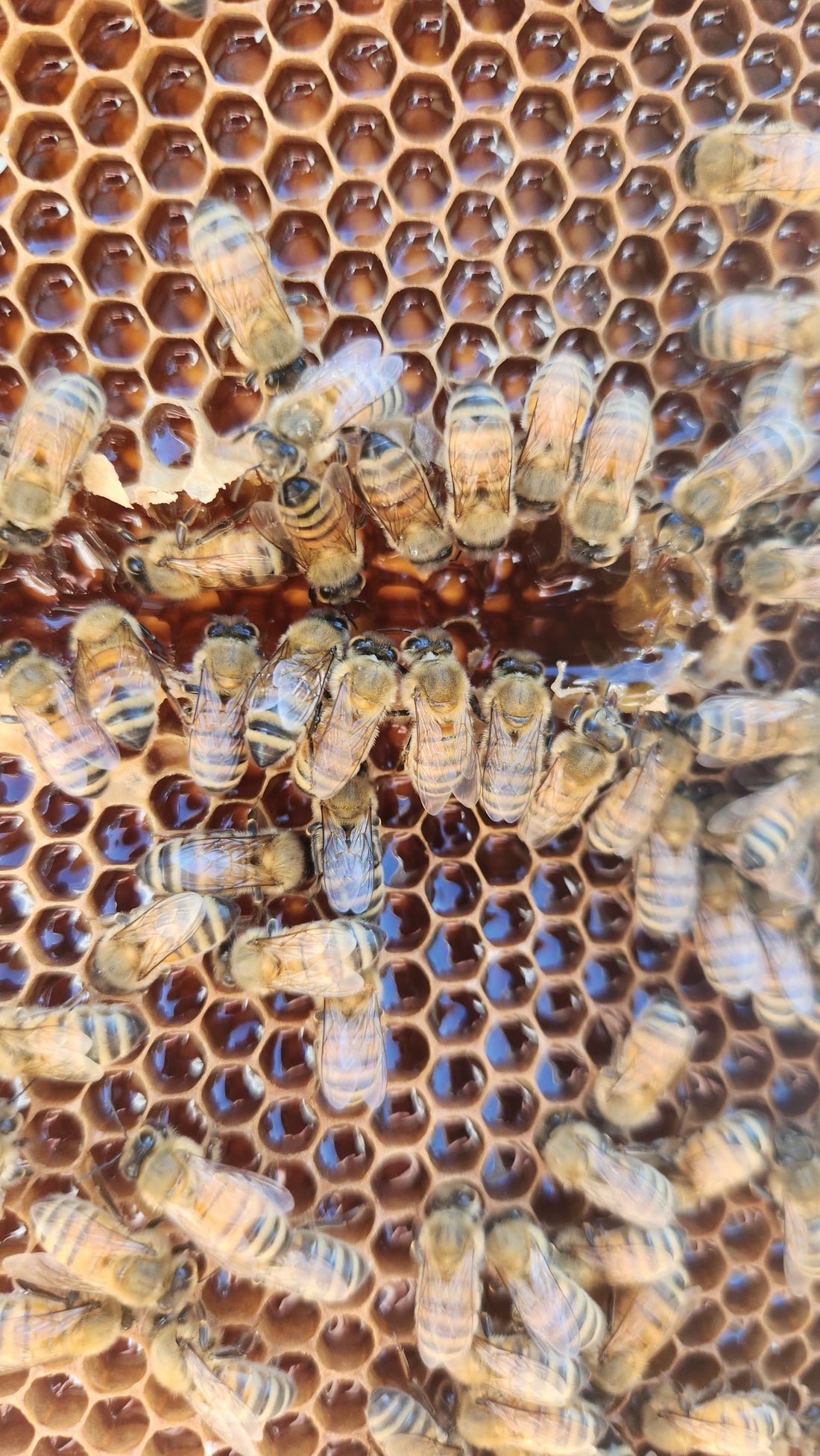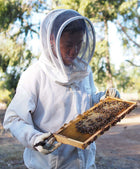Bees Eat First: Ethical Beekeeping and Premium Raw Honey

Bees Eat First: Ethical Beekeeping and Premium Raw Honey
We truly live by “Bees Eat First.”
At Bee Bee Natural, every jar of honey we harvest begins with one rule: bees keep their honey before we take it. We only harvest surplus honey, leaving plenty behind for the colony’s food stores and well-being. Many large commercial operations do the opposite – they take most of the honey and then feed the bees sugar syrup or corn syrup to keep them alive. However, research shows that natural honey provides micronutrients and enzymes that sugar water lacks. In other words, feeding bees only sugar cannot replace the diverse nutrition found in their own honey. By letting our bees “eat first,” we help them build strong, disease-resistant colonies and produce richer, more nutrient-dense honey.

Chris the beekeeper inspects a healthy hive, ensuring each colony has ample honey
Why Feeding Bees Real Honey Matters
Unlike ethical beekeepers, many commercial apiaries routinely feed bees sugar syrup or high-fructose corn syrup after honey harvest. Studies have found that bees on sugar diets show dramatic differences in nutrition and gene expression compared to honey-fed bees. For example, one study found that naturally foraged (flower-sourced) honey had higher protein, acidity and antioxidant levels than honey from sugar-fed hives, and flower-fed bees lived longer with better learning ability. In simple terms: honey-fed bees thrive, while sugar-fed bees miss out on key nutrients. Even human studies hint at this – as one researcher notes, “sugar is not sugar – different carbohydrate sources can act differently in the body”. By giving our bees access to their own raw honey (and diverse nectars from pristine forests) year-round, we uphold their health and, as a bonus, get superior honey quality.

A honeycomb teeming with healthy bees in a Jarrah forest – a result of natural, sustainable beekeeping. Feeding bees real honey instead of sugar supports colony health.
Our Ethics and Practices
To sum up, at Bee Bee Natural we combine tradition with science-backed ethics. Our approach to ethical beekeeping and sustainable honey production includes:
-
Bees Eat First (Ethical Harvesting): We harvest only the excess honey that bees don’t need. Leaving sufficient honey and pollen in each hive means our bees always have natural food, not sugar substitutes. This small practice boosts their immunity and wellbeing.
-
Chemical-Free Honey: Our hives are located in remote, wild Jarrah and Red Gum forests far from industrial agriculture. We use no pesticides or miticides, so our honey is 100% pure and chemical-free.
-
Raw & Lab-Tested: We never pasteurize or fine-filter our honey. Every batch is raw – keeping enzymes and antioxidants intact – and is lab-tested for purity and potency. You can taste the rich, authentic flavour that mass-produced honeys miss.
-
High-TA Premium Honeys: We’re proud to offer high TA honey. Our Jarrah honey (TA 63) and Red Gum honey (TA 55) are among the strongest antibacterial honeys in the world, with potent health benefits. This places them well above ordinary table honeys.
-
Sustainability and Local Connection: As a quality focused Singaporean, I practice small-scale, sustainable beekeeping with focus on healthy colonies over high yield, reflecting true premium honey care.
These practices mean the honey you buy from us is not only superior in quality, but also supports bee welfare and the environment. By avoiding over-harvest and artificial feeding, our bees are healthier and our honey is richer in nutrients.
In short, ethical beekeeping isn’t just a buzzword for us – it’s the foundation of what we do. We believe sustainable honey is created when beekeepers respect the bees’ needs first. The result is a premium product: raw, chemical-free honey that Singapore customers can trust for its purity and potency.
Ready to taste the difference? Experience Bee Bee Natural’s premium honey for yourself. Visit Bee Bee Natural to shop our Jarrah TA 63 and Red Gum TA 55 honeys today, and support beekeeping that truly puts bees first.
Sources: Modern research on bee nutrition and honey quality nature.comhoneybeehealthcoalition.orgpubmed.ncbi.nlm.nih.gov, and the Honey Bee Health Coalition Guidehoneybeehealthcoalition.org, all affirm that bees fed their own honey (not sugar substitutes) are healthier and produce higher-quality honey. Our own lab tests and practices ensure these findings are reflected in every jar of Bee Bee Natural honey.



